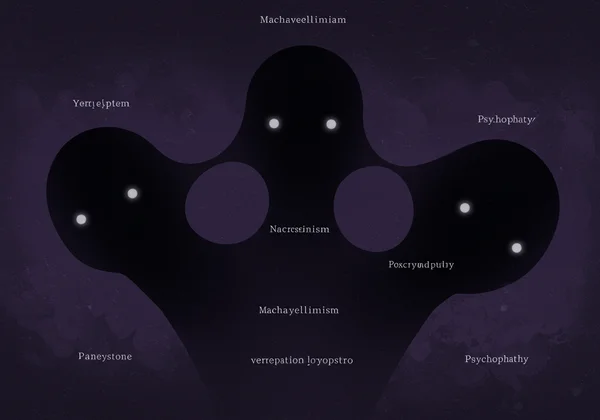Dark Triad Test: Unpacking Its Core Personality Traits
July 13, 2025 | By Julian Vance
Human personality is a fascinating tapestry, woven with countless threads that dictate our thoughts, feelings, and actions. Among these, certain traits stand out for their complex and sometimes challenging nature. This brings us to the intriguing concept of the Dark Triad. But how do I know if I am dark triad, or if someone I know exhibits these tendencies? Understanding these core personality traits—Machiavellianism, Narcissism, and Psychopathy—is not about labeling or judging, but about fostering deeper self-awareness and better understanding human behavior.
This exploration serves as a guide, offering insights into these distinct yet interconnected characteristics. By shedding light on the dark triad traits, we can better navigate interpersonal dynamics and embark on a journey of personal growth. To truly uncover your profile and gain valuable insights, consider taking a scientifically-backed assessment. You can begin your personal journey of discovery by visiting our homepage and taking a free Dark Triad Test.
What is the Dark Triad of Personality?
The Dark Triad refers to a trio of socially aversive personality traits: Machiavellianism, Narcissism, and Psychopathy. While each trait is distinct, they often co-occur and share a common core of callousness and manipulativeness. This framework offers a way to understand certain behavioral patterns that might otherwise seem inexplicable. Remember, having traits linked to the Dark Triad isn't a clinical diagnosis. Instead, these are tendencies that you can understand and manage to improve your personal well-being and relationships.

The Origins and Evolution of the Dark Triad Concept
The concept of the Dark Triad was formally introduced in 2002 by psychologists Delroy L. Paulhus and Kevin M. Williams. They observed that these three distinct, yet correlated, personality constructs often appeared together and were linked to undesirable social behaviors. Prior to this, each trait was typically studied in isolation. By grouping them, researchers gained a more comprehensive understanding of the complex interplay of these core personality traits and their impact on individuals and society. This integrated approach has since become a significant area of psychological research.
Why Understanding These Traits Matters for Self-Awareness
For individuals on a journey of self-awareness, understanding the Dark Triad can be profoundly insightful. It helps in recognizing specific behavioral patterns within oneself and others, offering a framework to interpret motivations and reactions. For instance, you might identify a tendency towards strategic thinking (Machiavellianism) or a strong need for admiration (Narcissism). This insight isn't about judgment; it's a powerful catalyst for personal growth. By acknowledging these traits, you can learn to harness their productive aspects (e.g., ambition, resilience) while mitigating potential negative impacts on relationships and overall well-being. Knowing yourself is the first step toward positive change; embark on this path by taking our personal assessment.
Machiavellianism: The Strategic Mind of Manipulation
Machiavellianism is a personality trait characterized by a manipulative, cynical view of others, a disregard for morality, and a focus on self-interest and deception. Individuals high in this trait are often strategic thinkers, adept at using cunning and persuasion to achieve their goals, regardless of the ethical implications. They view human relationships as a game to be won, often prioritizing power and control.
Defining Machiavellian Characteristics and Behaviors
People exhibiting Machiavellian characteristics tend to be emotionally detached, allowing them to make decisions purely based on logic and strategy without being swayed by sentiment. They are skilled at charming and influencing others, often presenting a facade of sincerity to gain trust. Key behaviors include:
- Strategic Planning: Thinking several steps ahead to manipulate situations.
- Calculated Deception: Lying or misleading others for personal gain.
- Emotional Detachment: Appearing cold or unaffected by others' feelings.
- Cynicism: Believing that people are inherently selfish and can be exploited.
- Focus on Power: Prioritizing personal advancement and control above all else.
While a high machiavellianism test score might suggest strategic thinking, it also points to a propensity for manipulation.

Real-World Manifestations: Machiavellianism in Action
In various real-world scenarios, Machiavellian tendencies can manifest distinctly. In the workplace, a highly Machiavellian individual might be a master negotiator, using information strategically to secure promotions or favorable deals. They excel in competitive environments, often rising through the ranks by outmaneuvering rivals. In social settings, they might subtly influence group decisions to align with their hidden agenda, all while maintaining a pleasant demeanor. For example, a project manager might subtly shift blame to a subordinate to avoid accountability, or a team leader might take credit for others' ideas to enhance their own standing. Understanding these behavioral indicators helps to recognize and navigate such dynamics.
Narcissism: The Pursuit of Admiration and Grandiosity
Narcissism is a personality trait marked by an inflated sense of self-importance, a deep need for excessive admiration, and a lack of empathy for others. Individuals with high narcissistic traits often harbor grandiose fantasies about their own success, power, or beauty, and they expect others to recognize their perceived superiority, even without commensurate achievements.
Key Traits and Types of Narcissistic Personality
The narcissism traits are generally categorized into two main types:
- Grandiose Narcissism: Characterized by overt arrogance, extraversion, dominance, and a strong sense of entitlement. These individuals are often charismatic and seek constant attention and admiration.
- Vulnerable Narcissism: Beneath a facade of arrogance, these individuals are often insecure, introverted, and highly sensitive to criticism. Their grandiosity is a defense mechanism against deep feelings of inadequacy.
Common traits across both types include a preoccupation with fantasy, a belief in being special, exploitative behaviors, and an inability to recognize or respond to the needs and feelings of others.

The Social and Interpersonal Impact of Narcissism
Narcissistic traits can significantly impact social and interpersonal relationships. Initially, the charismatic nature of some narcissistic individuals might be attractive, drawing others in. However, over time, their exploitative tendencies, lack of empathy, and constant need for admiration can strain relationships, leading to conflict and resentment. Friends, family, and colleagues may feel used, unappreciated, or emotionally drained. Narcissistic individuals often struggle with genuine intimacy, as their relationships are primarily transactional, serving to bolster their self-esteem. Understanding these social impacts can help you identify and manage interactions with such individuals.
Psychopathy: The Absence of Empathy and Remorse
Psychopathy is perhaps the most widely misunderstood of the Dark Triad traits. It is characterized by a profound lack of empathy, a disregard for social norms and the rights of others, impulsivity, and a tendency toward antisocial behavior. Individuals high in psychopathic traits often exhibit superficial charm, cunning, and a willingness to engage in risky or exploitative actions without experiencing guilt or remorse.
Understanding Psychopathic Tendencies
At its core, understanding psychopathic tendencies involves recognizing a fundamental deficit in emotional processing, particularly concerning fear and empathy. This doesn't mean they are emotionless, but rather that their emotional responses are often shallow or atypical. They may understand concepts of right and wrong intellectually but lack the emotional capacity to feel the impact of their actions on others. This allows them to manipulate, deceive, and harm others without internal conflict. They live primarily in the present moment, driven by their immediate desires.
Behavioral Indicators of Psychopathy
The behavioral indicators of psychopathy can vary but often include:
- Superficial Charm: Appearing likable and charismatic, often using flattery to manipulate.
- Pathological Lying: Deceiving others habitually and skillfully.
- Lack of Remorse or Guilt: Showing no regret for harmful actions.
- Callousness/Lack of Empathy: Inability to understand or share the feelings of others.
- Impulsivity: Acting on immediate urges without considering consequences.
- Irresponsibility: Failing to honor obligations or commitments.
- Early Behavioral Problems: A history of antisocial behavior from a young age.
These traits collectively paint a picture of individuals who operate outside typical moral and emotional frameworks, making their interactions unpredictable and potentially damaging.

The Interplay and Nuances of the Dark Triad Traits
While Machiavellianism, Narcissism, and Psychopathy are distinct, they often exist in various combinations and degrees within an individual. It's this interplay and nuances that make the Dark Triad so compelling to study. An individual might be highly narcissistic with moderate psychopathic tendencies, or primarily Machiavellian with subtle narcissistic traits. The way these elements blend can significantly influence an individual's behavior and their impact on those around them.
Overlapping Features vs. Distinct Differences
The overlapping features among the Dark Triad traits include a certain degree of callousness, manipulativeness, and a self-serving orientation. All three tend to prioritize their own needs over others' and are willing to use deceit to achieve their ends. However, their core motivations differ:
- Machiavellianism: Driven by strategy and cunning for power.
- Narcissism: Driven by a need for admiration and validation to maintain a grandiose self-image.
- Psychopathy: Driven by impulsivity, thrill-seeking, and a fundamental lack of empathy or remorse.
These distinct motivations lead to different behavioral expressions, even if the end result—manipulation or exploitation—might appear similar.
Why Some Individuals Exhibit These Traits
Dark Triad traits likely develop from a complex mix of genetics, environment, and early experiences. Some research suggests a biological component, particularly for psychopathy, involving differences in brain structures related to emotion and impulse control. Environmental factors, such as dysfunctional family dynamics, trauma, or certain parenting styles, can also play a role in shaping these personality tendencies. It's a dynamic interplay between nature and nurture that contributes to why some individuals develop these specific behavioral patterns.
Moving Forward: Understanding Your Dark Triad Profile
Exploring the Dark Triad is a journey into the complex depths of human personality. It offers invaluable insights into the strategic, self-admiring, and emotionally detached aspects that can exist within individuals. Understanding these traits, whether in ourselves or others, is a powerful tool for enhancing personal growth and navigating social landscapes more effectively. Remember, this framework is for awareness and self-reflection, not for diagnosis or judgment.
If you're curious about your own unique blend of these dark triad traits, taking a scientifically-backed assessment can provide a clearer picture. It's a confidential and insightful way to gain a deeper understanding of your personality profile. Empower yourself with knowledge and clarity. Discover your profile and start your journey towards profound self-awareness today.
Frequently Asked Questions About the Dark Triad Traits
How do I know if I am dark triad?
The only way to get an indication of your Dark Triad tendencies is by taking a reliable personality assessment. While self-reflection can offer clues, a structured dark triad test provides standardized scoring against a broader population, giving you a clearer, objective understanding. Our platform offers a comprehensive and scientifically-backed online assessment to help you uncover your profile.

How do dark triad people act?
Individuals with strong Dark Triad traits often act in self-serving ways, using manipulation, charm, and deceit to get what they want. They may appear confident and charismatic, but often lack genuine empathy and remorse for their actions. Their behaviors are typically goal-oriented, prioritizing personal gain over ethical considerations or others' well-being. The specific dark triad traits they exhibit (Machiavellianism, Narcissism, Psychopathy) will influence the precise manner of their actions. For instance, a Machiavellian individual might be subtly strategic, while a narcissistic person might be overtly attention-seeking.
What is Machiavellianism vs narcissism?
While both Machiavellianism and narcissism involve self-interest and a willingness to manipulate, their primary drivers differ. Machiavellianism is characterized by cold, calculated manipulation and a cynical view of human nature, with the ultimate goal of gaining power or resources. Narcissism, on the other hand, is driven by an inflated sense of self-importance, a constant need for admiration, and a grandiose self-image. A Machiavellian person manipulates to control outcomes, while a narcissistic person manipulates to maintain their ego and secure adoration.
Disclaimer: This article content is for educational and informational purposes only and should not be considered a substitute for professional psychological consultation or medical diagnosis.